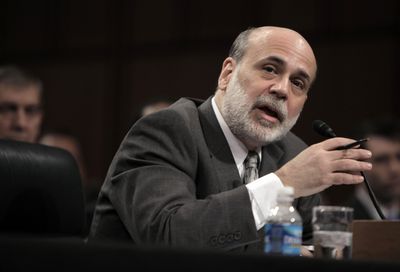Bernanke tells Senate panel recovery possible next year
But system must be stabilized, he says

WASHINGTON – The nation’s top economic policymaker Tuesday offered a sliver of optimism in a time of gloom, saying in carefully hedged comments that growth could return next year if the financial system is put in order.
In congressional testimony, Federal Reserve Chairman Ben Bernanke depicted an economy undergoing a “severe contraction.” But Bernanke said the recession could end in 2009, paving the way for a “year of recovery” in 2010.
Any turnaround, the Fed chairman made clear, will depend on whether government efforts succeed in stabilizing the financial markets.
The situation is “basically black and white,” he told the Senate Banking Committee Tuesday in his semi-annual testimony on monetary policy and the economy. “If we stabilize the financial system adequately, we’ll get a reasonable recovery. … If we don’t stabilize the financial system, we’re going to founder for some time.”
Financial markets soared on Bernanke’s remarks, with the Standard & Poor’s 500-stock index up 4 percent yesterday, even as new data showed that consumer confidence hit an all-time low and home prices continued dropping at a record pace in December.
Any economic recovery next year could be weak, both Bernanke and private economists acknowledge, probably with continued high unemployment. The economy faces major risks from a deepening global recession and a reinforcing cycle of economic weakness and financial frailty.
“You can get growth in 2010, but maybe not strong enough growth that people really feel the benefits,” said Diane Swonk, chief economist at Mesirow Financial.
But unlike many other economists, Bernanke is arguing that if the financial system fails to return to function normally, it is out of the question that the economy could recover.
Where Bernanke sees black and white, some economists see gray. “That’s a bit extreme,” said Michael Feroli, an economist with J.P. Morgan Chase. “Everyone knows that Bernanke built his name as an academic on how important the financial sector is for the real economy. But the emphasis he put on it today stretches the case.”
The Fed chairman’s comments also seemed to acknowledge that there is no guarantee that extraordinary federal efforts to stabilize the financial system – including government investments in banks and Fed lending to all types of entities – would be enough to fix things. That could even be viewed as a signal to Congress that any requests for more money and authority should be approved in the interest of bringing stability to financial institutions.
The government has taken considerable steps to address the recession, with the Fed cutting the short-term interest rate it controls to essentially zero and the Obama administration winning congressional approval of a major stimulus package – steps that Bernanke argued have less chance of working without a healing of the financial system. If financial conditions improve, “the economy will be increasingly supported by fiscal and monetary stimulus,” lower energy prices, business inventories that are more in line with sales, and greater availability of credit.
In a sometimes spirited give-and-take Tuesday, Bernanke offered a metaphor to defend the government’s efforts to bail out institutions and homeowners who have gotten into financial trouble. “If your neighbor smokes in bed and sets his house afire and you live in a neighborhood of closely packed wooden houses, you could punish him very severely by refusing to send the fire department. And then he would probably learn his lesson about smoking in bed. But unfortunately, in the process you would have the entire neighborhood burning down.”
Bernanke’s preference, he said, would be to put out the fire and set tougher rules to prevent fires in the future.
Some of those rules could be enacted by the Fed if it were given broader regulatory power, an idea that has been supported by some in Congress. But Sen. Christopher Dodd, D-Conn., chairman of the Banking Committee, expressed skepticism of the idea.
“Chairman Bernanke, I’d say your plate is full,” said Dodd, holding up a document detailing the many programs the Fed has launched to combat the financial crisis. “As this committee works to modernize our nation’s financial regulatory structure, the question is whether we should be giving you a bigger plate or whether we should be putting the Fed on a diet.”
“When you keep asking an agency to take on more and more, it becomes less and less likely that agency will succeed at any of it,” Dodd said. By contrast, House Financial Services Committee Chairman Barney Frank, D-Mass. has said he is inclined to give the Fed new responsibility to regulate the stability of the financial system as a whole.
In his testimony, Bernanke reviewed Fed leaders’ recently released estimate that the economy is likely to shrink this year. But even as he outlined such projections, he described the environment as highly uncertain. “Nobody’s record in forecasting this thing has been particularly good,” Bernanke said.